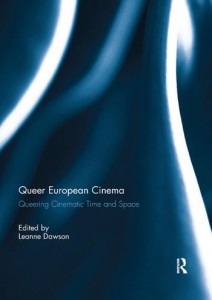Queer European Cinema
Queering Cinematic Time and Space
Sous la direction de Leanne Dawson


Moyenne des votes : ![]()
| 0 | vote | |
| 0 | vote | |
| 0 | vote | |
| 0 | vote |
Votre vote : -
Description de l'ouvrage:
Queer European Cinema commences with an overview of LGBTQ representation throughout cinematic history, interwoven with socio-political reality in Europe and beyond, to consider trends including the boarding school film, the gay road movie, and queer horror such as the lesbian vampire tale, before analysing case studies from the ‘low culture’ of pornography to the ‘high culture’ of arthouse cinema.
This collection of essays explores borders and boundaries of geography, temporality, ethnicity, class, gender, sexuality, and desire in a range of European films at a time when both LGBTQ politics and the concept of Europe are under intense scrutiny in representation and reality, to demonstrate how LGBTQ film can serve as a political tool to create visibility and acceptance as well as providing entertainment.
Chapters include an analysis of both trans and femme identities in Academy Award-winning Boys Don’t Cry alongside German film, Unveiled; the intersection of lesbian visibility and the notion of nation on the Croatian screen at its point of entry into the European Union and during the gay marriage referendum; music and its relation to camp in Italian transnational cinema; European lesbian feminist pornography; and an analysis of liminal spaces and citizenship in queer French-language road movies. This book was originally published as a special issue of Studies in European Cinema.
À propos de l'auteur :
Dr. Leanne Dawson is a Lecturer in German and Film Studies at the University of Edinburgh and Chair of the Scottish Queer International Film Festival. Her research focuses on LGBTQ representation in film, literature, theatre, performance art, and archives. Her publications include Queering German Culture (Camden House, 2017), Queering European Film Festivals (Taylor & Francis, 2017), and The Other: Gender, Sexuality and Ethnicity in European Cinema and Beyond (Taylor & Francis, 2014). She employs her academic research to create, promote and support queer culture beyond the academy: she has worked as a consultant for theatre; curated and introduced film seasons for cinemas; spoken about LGBTQ matters on the BBC; and is making a documentary, Femmes on Film about femme representation and socio-political reality.
Voir le site internet de l'éditeur Routledge
> Sur un thème proche :
Science on Screen and Paper (2024)
Media Cultures and Knowledge Production in Cold War Europe
Dir. Mariana Ivanova et Juliane Scholz
Music, Authorship, Narration, and Art Cinema in Europe (2024)
1940s to 1980s
Haunted Europe (2021)
Continental Connections in English-Language Gothic Writing, Film and New Media
Dir. Evert Jan Van Leeuwen et Michael Newton